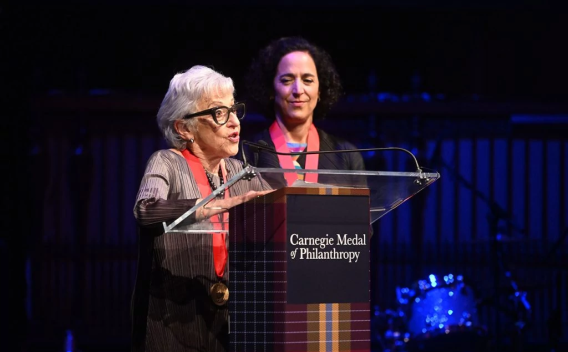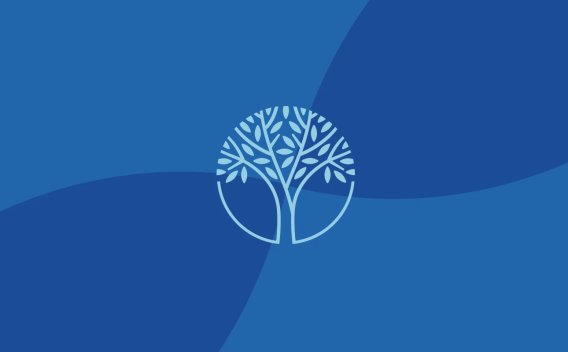By
Published
April 2, 2019
Tags
David Rittberg, Director of the Charles and Lynn Schusterman Family Foundation's U.S. Jewish grantmaking portfolio, was presented with the 2019 JJ Greenberg Memorial Award at the Jewish Funders Network (JFN) 2019 International Conference in San Francisco. The award honors foundation professionals engaged in grantmaking, age 40 and under, who have demonstrated extraordinary leadership in Jewish philanthropy. Felicia Herman, Executive Director of NATAN, presented the award.
Watch the video (or read the transcript) of David's acceptance speech below to hear the traits he belives all foundation professionals should exemplify in their work: curiosity, trust-building, and, most importantly, kindness.
https://youtu.be/1U7M1CeBIwM?t=233
Good morning! Thank you, Felicia—that was so nice. I’m so lucky to have you as a friend in all of this. And thank you, JFN, for hosting.
When I got the call that I was receiving this incredibly humbling award, I had to remember back to the last time I’d received any award at all. My best guess is 1989 Binghamton, New York, JCC Basketball. And—it gets worse— I got a trophy for Most Improved Player, which is effectively the lowest compliment in basketball in Binghamton, New York.
The truth is, is I don’t see this as an individual recognition. I am part of an amazing team at the Schusterman Foundation and this has far more to do with the people I work with than anything I’ve done myself. A bunch of them are here, and I’m grateful for them. I can’t name them all, but allow me a few brief shout outs:
One, to Stacy and Lynn: it is a privilege to do this work with you and on behalf of your family. And on behalf of all of us at Team Schusterman, it is not lost on us how fortunate we are.
To Sandy Cardin, it’s been such a joy to work with you, and I’ve learned an immense amount from you about how to do this work and how to create change. You’ve been such a good mentor and a friend since really minute one—since my interview.
And last, but not least, to Lisa Eisen—there’s a lot I could say and should say, but I’m going to boil it down to this: everyone should be so lucky to have you as their boss, as their mentor, as their friend and as their role model. It is amazing to watch what you do, but it’s actually more amazing to watch how you do it.
Which is the perfect segue to J.J. Greenberg.
I met and had one conversation with J.J. Greenberg about 17 years ago, a month before he was tragically killed. It was a Hillel training retreat for my first job, a couple of weeks into my professional career. And he approached me and asked me to talk, and I didn’t really know why.
I don’t have a strong memory about what we spoke about, but I vividly remember how it felt. There was sort of this crowded, chaotic scene; we were at a camp, we were sitting on a bench, there were people all around us. And J.J. had this huge smile the entire conversation. He was totally locked in and focused on me. He asked me a ton of questions about myself, my life, my interests and my goals. He seemed genuinely interested in having a conversation with me, this totally random young person.
Over the last few weeks as I’ve talked to people who knew J.J. and I’ve read about him, this experience seems totally commonplace. Felicia just mentioned that everyone speaks of his gift for a human connection. People speak about his extraordinary work and everyone talks about him as the prototypical mensch. Mensch is the word used most often in describing J.J.
I realize now, that J.J. was probably the first foundation professional I’d ever met—we didn’t have a lot of those in Binghamton, New York. And that tiny interaction between us actually serves as the perfect example of how I want to do my work and how I think all of us in this room should strive to behave in this work.
Kindness and curiosity and trust-building are not just nice things to do. They are nice things to do, but they’re actually essential practices if you want to do this work well and if you want to do this work with excellence—which I imagine all of us do.
This work is hard and complicated. The world seems to be getting crazier and the work seems to be getting more complicated as a result. My experience tells me that more often than not, it’s the people closest to the ground, the people doing the work—our grantees— who are the ones who have the clearest ideas about gaps that exist, can identify opportunities, can identify challenges and have the best ideas for how to make change.
With the power dynamic that exists in our work between funder and grantee, we’re just never going to get to any of those good ideas unless we are in real relationship with people, and those relationships are based in trust. And kindness is the perfect starting point.
Lucky for all of us, you do not need to dig too deep into our tradition to understand and learn about the power of kindness. There are many that would argue it is the central value of this entire enterprise. I’m going to argue that it is one of the three legs that the world stands on: study, service and kindness.
And, from everything I’ve learned about J.J., he seemed to be one of those rare people who could balance and exemplify all three of those. And what an amazing example for all of us to aspire to and a lesson in how we should all do this work.
I’m very blessed to have some heroes in my own family. My grandparents were partisans in World War II. And when my wife, Jenny, and I talk to our kids, Eli and Amalia—who are convinced that this speech is going to be available on Netflix and Amazon Prime—when we speak to them about the kinds of values that we want them to have, and the kind of family we want to be in, how we want to live and what we want to uphold, we talk about our family’s story.
And now, because of this tremendous honor, I’m going to get a chance to talk to them about J.J. and everything that he stood for. And I’m grateful for this.
Thank you so much. Enjoy the rest of the conference.
Based in Washington D.C., David has led grantmaking initiatives at the Charles and Lynn Schusterman Family Foundation since 2012. He previously served as Executive Director at the Edgar M. Bronfman Center for Jewish Student Life at NYU Hillel at New York University.






